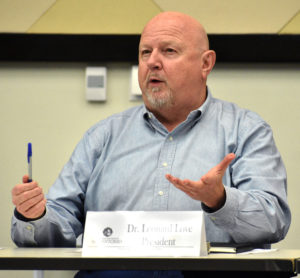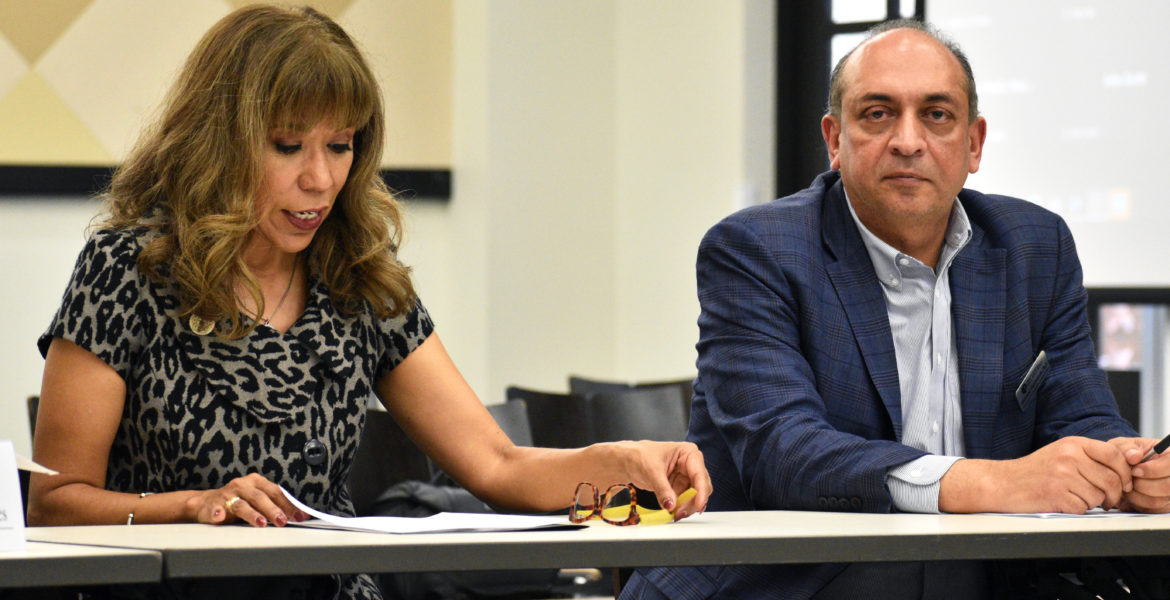Texas A&M University-San Antonio President Cynthia Teniente-Matson announced Nov. 30 that faculty will receive merit raises in March 2023 as an initial measure to address concerns about compensation.
This follows a Nov. 2 announcement that the university would provide a cost-of-living raise for the lowest-paid staff.
Compensation for faculty and staff has been a growing concern at A&M-San Antonio. In spring, the university in conjunction with the Faculty Senate commissioned a consulting firm, Evergreen Solutions, to do a compensation study to identify issues and recommend solutions.
The initial results were released in November and were met with concerns from some faculty who attended informational sessions led by an Evergreen consultant.
Dr. Scott Gage, associate professor of English and president of the university’s chapter of the American Association of University Professors, shared some reactions he heard from faculty.
Gage, who spoke with The Mesquite on Sept. 6 and Nov. 18, said that faculty are frustrated that it appears getting this issue resolved is going to be a slow process, one that could be drawn out even more by the imminent departure of Matson and Kathryn Funk-Baxter, chief financial officer.
“There’s just this revolving door at the level of administrators, upper administration at our institution,” Gage said. “And so it just raises questions of who is going to pick up this issue and what are they going to do with it?”
University officials have said they are listening to faculty feedback from the information sessions.
Now, A&M-San Antonio has taken the first step in addressing compensation concerns, announcing a merit raise for faculty and a cost-of-living adjustment for staff.
What is merit pay and how does it impact faculty?

Merit pay is a way in which professors receive raises or bonuses based on their performance over the previous year.
“Merit pay is the primary mechanism at most schools where they at least get some sort of opportunity for a regular pay raise … it has merit, it has to be based on the job you’re doing,” said Leonard Love, associate professor of business and Faculty Senate president, in a Sept. 7 interview.
The university has promised to implement a 2% merit pool to reward well-performing faculty, according to Matson’s report to the Faculty Senate at their Dec. 2 meeting.
Merit pay has not been a regular practice at A&M-San Antonio so far, according to Love, and has usually been in the form of a one-time bonus, rather than a salary increase.
The irregularity of merit raises or bonuses also clashes with the lengthy process of academic research.
According to Love, staying current in one’s field through academic research is a key factor in merit evaluations for some faculty. The publishing process for these can take over two years though.
“If your merit is not an annual thing, maybe last year, you had two really good publications, but there was no merit money,” Love said. “This year, there’s merit money, but you don’t have anything. … Next year, you’ll probably have two more, but this is the year when they determine that.”
Love said that merit pay serves as one of the only sources for professors to receive regular pay increases.
Gage agreed.
“There’s no consistent way outside of merit pay to address cost-of-living increases. And that means that our salaries are slipping further and further and further behind. It’s not keeping up with inflation.”
With the cost of living constantly increasing, the lack of regular raises is having an impact on faculty and staff.
“Some of my colleagues are not making enough money to meet their living needs,” said Dr. James Finley, associate professor of English in a Sept. 8 interview. “And I know that a lot of staff are not making enough money to meet their living needs.”
Gage shared some of those concerns.
“These are highly educated, highly trained, skilled people who deserve to … have a wage that allows them to live comfortably,” Gage said. “When I say comfortably, I’m not saying like buying Porsches and everything. I mean being able to pay rent.”
How is ‘merit’ determined?
Merit pay is not a fix-all solution, however. It has some major problems as well.
Gage described two other major issues with merit pay in addition to irregularity.
“One, the criteria that’s used to evaluate faculty for merit raises has not thus far been clear at this institution. … I may get a merit raise and I have no idea why, or no idea how that particular number represents the work that I did,” Gage said.
The A&M-San Antonio official policy on merit salary increases lists the following criteria for awards
- Demonstration of meritorious outstanding performance as evidenced in the most current performance evaluation;
- Demonstration of efficient use of state resources that result in significant savings to A&M-San Antonio;
- Contribution of an implemented innovative idea that enhances the operation of A&M-San Antonio; and/or
- Demonstration of outstanding service to the department, A&M-San Antonio or the System that advances the purpose and mission of A&MSan Antonio or that is above and beyond the requirements of his/her position.
The second issue Gage described is that merit pay tends to benefit faculty who are already in a position to be productive in scholarly writing.
“You’ll have them make more money than someone who’s doing equally important work. But who is in a position that does not allow them to be as productive in terms of their writing? And so there’s, there’s like this built-in inequity there,” Gage said
Finley also sees some major problems with the merit pay process.
“I think that merit raises are, at the same time as they can help certain people, they can be harmful, because we’re competing against each other,” Finley said. “And because teaching, which is the main part of our jobs, is something that is hard to quantify.
“Merit raises are helpful because they boost people’s salaries. But they don’t help morale because they can often align with already existing inequalities.”
Finley said that he does not support how merit pay currently functions.
“I’m opposed to merit raises, I think that they need to be distributed in a more equitable way, and the way that faculty themselves decided upon,” Finley said.
How did this become a problem?
The compensation issue at A&M-San Antonio is one that has been building for years.
Love said that he joined A&M-San Antonio in 2011 knowing that it was a startup university.
“As a startup, there’s limited resources,” said Love. “And so in a lot of instances it was, ‘do we increase pay? Or do we invest in this building or adding this program?’ And so there were a lot of trade-offs.
“A lot of faculty were willing to accept that with the idea of, at some point, we’re going to start catching this up.”
However, Love said he feels the issue keeps, “getting kicked down the road.”
“It’s gotten to a point where it’s become a real crisis,” Love said. “And what we’ve seen in the past is instances where the administration would do a one-time bonus. That’s not the same as a raise, particularly when we’re in the inflationary environment we are now.”
That inflationary environment and the ever-rising cost of living in San Antonio, as mentioned by Gage and Love, are also a major source of the current compensation crisis.
How do these issues impact students?

The conversation about compensation largely surrounds faculty and staff, but it isn’t a problem that only affects them.
Gage stressed how these issues can have a major impact on students.
“It may seem as though this issue is only affecting faculty and staff; it’s affecting students as well,” Gage said. “It’s affecting students because the working conditions of faculty are the learning conditions of students.”
Finley explained how faculty morale has an impact on students.
“For the most part, faculty are primarily interested in student success,” Finley said. “And if we’re having a conversation about pay, without thinking about morale, we’re missing that because morale is, in many ways, the difference between people staying and leaving.”
Finley also stressed the importance of making sure the money used for faculty raises didn’t come from anywhere that would impact students or staff.
“I don’t want a modicum of a raise if that money comes out of things that lead to poor conditions for students,” Finley said. “My morale, as a faculty member is intimately tied to student experiences.
“We also care a lot about the pay of our staff colleagues and we care a lot about the conditions of students.”
Ultimately, Finley stressed that this issue is important to everyone at A&M-San Antonio, not just faculty.
“When we’re advocating for better pay, we’re not being selfish,” Finley said. “We’re advocating for better working conditions, in part because we think we should be valued. But we’re also doing that because we care about our students, right? And that’s why we’re advocating for staff raises too, because staff working conditions are student learning conditions, too.”
What’s next?
The university has taken initial steps toward resolving the compensation issues for faculty and staff but said in its announcement of the merit award plan there’s more to come:
“It is only one element of our plan to address compensation, which remains a critical University priority.”
The reviews of the compensation studies for faculty and staff are ongoing, and further sessions to gather faculty feedback are being held.
A&M-San Antonio administration says the feedback will inform how the university addresses the findings of the studies.
Make sure to check back with The Mesquite in spring 2023 for ongoing coverage of the story.







